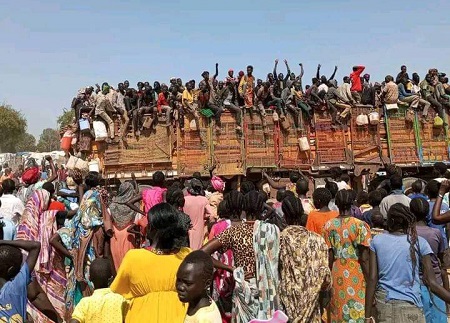Perpetuating Neglected Displacement across Sudan

A year and half have passed since full-scale civil war erupted in April 2023 between the Sudan Armed Forces (SAF) and its off-shoot Rapid Support Forces (RSF). The war has killed more than 18,000 people, and wounded 33,000, and forced around 11 million people from their homes. More than 2 million of them have sought asylum and refuge in neighboring countries, principally Chad, South Sudan and Egypt, but also further afield in Uganda and Kenya. Nearly, 30% of Sudan`s population has been displaced, and more than half of those are displaced women, caring for more than a quarter of them, children under the age of five.
The humanitarian crisis in Sudan, with Africa’s largest population and land surface, has deteriorated further since the most-recent Land Times/أحوال الأرض report. About half of Sudan’s 24.6 million population, face severe hunger and food insecurity, while 70–80% of hospitals in conflict-affected areas are not functioning. Fully 19 million children are deprived of school, and 2.9 million children are acutely malnourished, while another 729,000 children under five are suffering from severe and acute malnutrition.
The International Organization for Migration’s global Displacement Tracking Mechanism (DTM) statistics, accounting for both those displaced before and after 15 April 2023, show that the protracted displacement crisis in Sudan represents the world’s largest: one in every eight displaced persons worldwide is Sudanese, and Sudan hosts approximately 13% of all internally displaced persons globally.
Indigenous Peoples Targeted
This catastrophic conflict, has led to hundreds of houses and villages severely destroyed by fire and damaged vital infrastructure, specifically, in al-Fāshir, North Darfur’s capital. The town is home to 1.5 million people, after the RSF and allied militias raided villages, committed crimes described as ‘ethnic cleansing,’ involving rape and looting directed against Masalit people across Darfur.
Last March saw the highest monthly habitat-related human rights violations, with 39 incidents of arson. The RSF has destroyed villages in Darfur, razing entire towns such as Ardamata, al-Janayna, Misterei and Tandelti , displacing and killing thousands of Masalits.
While the two belligerents (SAF and RSF) have been focused on attacking each other elsewhere, the peoples of Nuba Mountains (South Kordofan) have not been spared. The region remained largely defended by the Sudanese National Liberation Army (SPLM), opponents of the ancien régime of Muhammad `Umar Bashīr. After suffering decades of SAF airstrikes and other attacks on their lives, land and food sovereignty, the Nuba Mountain peoples are now facing killer famine, while also hosting an estimated 700,000–1 million other Sudanese IDPs in 15 camps across their territory, served by only a single dirt-road humanitarian corridor.
Added Environmental Hazards
Moreover, floods and dam collapse have intensified IDP suffering. Between 1 April and 31 October 2024, sudden displacement has resulted from 140 extreme environmental-hazard incidents, in addition to earlier-reported incidents of fire and flood. These included at least 12 displacements due to fires, and 128 incidents due to heavy rain or floods in 16 states across Sudan, affecting 38,406 households (about 192,030 persons).
The 24 August 2024 Arba`at Dam collapse, amid torrential rains, killed 30 persons and effected around 50,000 people in 70 villages around the dam, completely destroying 20 of them. The resulting floods destroyed more than 25,000 shelters and community structures, forcing many displaced individuals to seek refuge with host communities and in schools.
Global Response Fails
The international community’s efforts at a ceasefire have been inadequate and scattered, as both warring parties have systematically perpetrated large-scale violations, including indiscriminate and direct shelling and airstrikes against civilians, schools, hospitals, communication networks, vital water sources and electricity supplies. This is despite the 11 March 2023 Jeddah Declaration of Commitment to Protect the Civilians of Sudan (Jeddah Declaration), by which the belligerents outlined the rules they stated would guide their conduct to ensure the delivery of humanitarian assistance, essential services, healthcare and proper burial.
The prospects of both humanitarian relief and peace making remain elusive also as long as external states fuel the conflict, with the UN and other authoritative sources point to the role of the United Arab Emirates (UAE) and Russia as key to prolonged suffering in Sudan. Meanwhile, only a fraction of the UN’s February 2024 funding appeal for $4.1 billion has been met. Moreover, with Western state indulgence, UAE forms the essential link among prolonged regional wars, foreign occupation and displacement mirrored in neighboring Yemen across the Red Sea.
All Sudanese and extraterritorial perpetrators nonetheless remain liable, but enjoy impunity without an integrated approach to restorative justice. Those human-made obstacles impede the longer-term humanitarian and human rights challenge toward durable peace and development. Meeting that challenge makes even more remote the housing, land and property (HLP) restitution and reparation to which all the region’s forcibly displaced persons remain entitled.
Photo: Sudanese displaced from the fighting take onward transportation from border areas to South Sudan. Source: Caritas South Sudan.
|